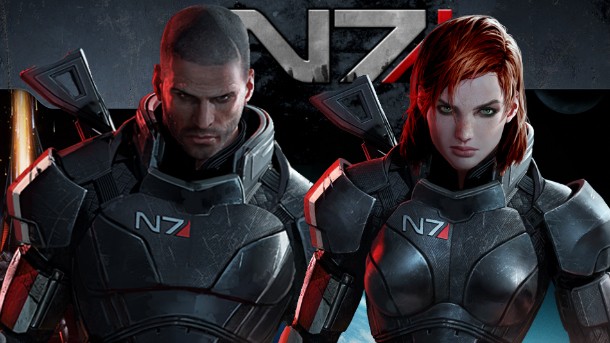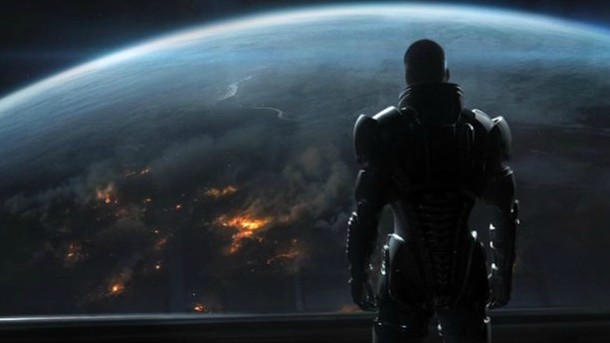Subscribe today to receive the next issue of Game Informer, featuring the Most Anticipated Games of 2026!
Remembering Commander Shepard

Today, in an interview with VG247.com, BioWare Montreal’s Fabrice Condominas confirmed what we’ve long suspected: Commander Shepard will not appear in future Mass Effect games. “There is one thing we are absolutely sure of,” commented Condominas, “there will be no more Shepard, and the trilogy is over.”
Now, at the end of Shepard's journey in games, I look back on Mass Effect and what the commander meant to me.
[Warning: this story contains spoilers]
The Mass Effect series is a seminal accomplishment for multiple reasons. Not only did BioWare craft a trilogy rivaling the great science fiction films, but also unified them under one story arc better than any of its individual parts. There’s a core experience that everyone who has played Mass Effect shares, but it’s the choices they make that ensure they see it differently. At the heart of it all is Commander Shepard.
Although Shepard is an iconic character, everyone sees the commander differently. BioWare didn’t even specify the gender of their flagship protagonist. From the outset, you’re granted characterization options that let you shape Shepard’s background and appearance. I opted to play as a male war hero from Earth. After altering his facial appearance, he looked nothing like the soldier gracing the cover of the Mass Effect case. BioWare gives you these options for fleshing out the commander, but it all ends there; the rest is in your hands.
Shepard isn’t a silent protagonist. However, for a character that does so much talking of his own, I’m immediately empathizing with him. Dialogue choices allow me to inject my own personality into the story, and in turn affect it in my own way. I decide who comes on missions with me, who joins my squad, and even who lives or dies. When the moment arrives that forces me to choose between Kaidan and Ashley, I’m torn. I’ve been growing more and more attached to Ashley, but this isn’t a minor decision; their lives are in my hands. After lengthy contemplation, I choose to send Kaidan to his death, cementing Ashley’s place in the remainder of the trilogy.
The full weight of my choice wasn’t driven home until years later, during my first playthrough of Mass Effect 3. Ashley returned to my squad after her hiatus in Mass Effect 2, but my friend was fighting alongside Kaidan in his game. This divergence from the set cast of most games astonished me, and almost required me to import the save file in which Kaidan survived. I couldn’t believe that my choices made such an impact on the entire trilogy plot, and I felt more attached to Shepard than ever.

Throughout Mass Effect 2, BioWare places the responsibility of the Normandy squad on my shoulders once again. As Shepard, it’s not only my job to improve my allies’ abilities, but also create personal bonds with them. I’m enraptured with every loyalty mission and conversation in an effort to gain their trust, knowing that it could pay off in the long run.
When the final suicide mission rolls around, I feel ready to delegate tasks to the squad members I trust the most. I was able to learn everyone’s strengths, weaknesses, and personalities, and it helps me in the end. I’m thinking as a commander, but also as a friend. The fates of others are placed in my hands, and I’m struggling to leave emotion out of my decision-making, but BioWare once again places me right in the shoes of the hero in a tense situation. I trust Legion to navigate the vents and open the door in our way, and I know that Samara is a powerful biotic who can shield us when we need it. Upon defeating the Human-Reaper, my involvement in the game pays off; I can almost feel Shepard’s relief emulating from the television screen as I escape the mission with everyone alive. The second installment of the Mass Effect trilogy is my favorite for several reasons, the chief one being the way my actions as Shepard crafted my own unique story.
Mass Effect 3 brings every choice from the two previous games to bear. The weight of the Reaper assault is falling on the civilizations of the universe, and Shepard is the greatest hope of defeating them. Unfortunately, the ending drew negativity as many fans felt like their decisions weren’t accounted for in the script. On the other hand, many loved the ultimatum that was thrust on them in the final moments of the trilogy. I find myself in the latter camp. I love how all of my involvement in Shepard was brought to the forefront in my attempt to stop the Reapers by any means necessary. Should I choose destruction, control, or synthesis? After spending three games in the role of Shepard, I opt for synthesis, believing it to be the only way the Reapers can be stopped for good. It was a fitting end to a character I felt so attached to, and I can’t wait to experience the whole story again.
Many video games allow you to shape your character any way you want. Whether it is appearance, abilities, or play style, you’re free to do as you please. The reason that Shepard makes such an impact is that not only can you affect your own story, but the entire Mass Effect plot as well. Most memorable video game characters are loved because of the shared experience gamers had with them. Shepard is unusual because he accomplishes the same feat in so many different ways, and that won’t easily be forgotten.








